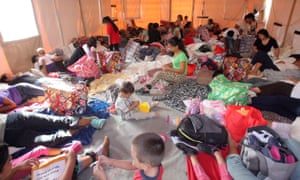HUNDREDS OF CHURCHES OFFER SANCTUARY TO UNDOCUMENTED MIGRANTS AFTER ELECTION
Growing number of synagogues as well as two dozen cities offer protection amid threat of deportation under Trump administration

Hundreds of churches in the US have said they are willing to provide sanctuary for undocumented migrants threatened with deportation following the election of Donald Trump as president.
About 300 churches nationally have come forward in the past two weeks, according to the Philadelphia-based New Sanctuary Movement. It has also seen the number of people in the city registering as volunteers for its “sanctuary in the streets” programme rise from 65 to more than 1,000 since the election.
The Church World Service estimates 400 churches nationwide are willing to open their doors to people at risk of deportation. A growing number of synagogues are also involved in actions to prevent deportations.
Meanwhile, about two dozen cities – including New York, Chicago, Seattle, Philadelphia and Los Angeles – have declared themselves “sanctuary cities”, with mayors pledging to refuse to cooperate with federal immigration orders that could lead to deportations. Trump has said he will block federal funding to such cities.
During his election campaign, Trump said he would deport an estimated 11 million undocumented migrants from the United States. Since becoming president-elect, he has said he plans to immediately deport or incarcerate 2 to 3 million undocumented migrants who have been convicted of crimes.
“What we are going to do is get the people that are criminal and have criminal records, gang members, drug dealers, we have a lot of these people, probably 2 million, it could even be 3 million, we are getting them out of the country or we are going to incarcerate. But we’re getting them out of our country, they’re here illegally,” Trump told 60 Minutes a few days after the election.
According to Peter Pedemonti of the New Sanctuary Movement, “people are very scared. There are waves of despair, anger and disbelief at Trump’s election and the rise of white supremacism. This is a very shocking part of US society that was in the shadows before, and with Trump it has come into the mainstream. It’s very disturbing.”
He said he had seen a “pretty dramatic swell in congregations coming forward and asking questions about how to get involved. We’ve had a wave of people contacting us about sanctuary.”
Pedemonti added: “The faith community has a specific role to stand up and speak out, and offering sanctuary is a bold way of doing that.”
Javier Flores, an undocumented Mexican who has been deported several times, took sanctuary in the United Methodist Church in Arch Street, Philadelphia, five days after Trump’s election although his current deportation process started before the 8 November poll.
“The church is providing space and support for as long as Javier wants to be here,” said the Rev Robin Hynicka. The father of three’s “first and foremost desire is to stay with his family”.
Anxiety over immigration issues before the election had been exacerbated, said Hynicka. “People are feeling more vulnerable than before. [But] people of faith and conscience are walking alongside the immigrant community. Sanctuary provides a moral alternative to what we think is an immoral policy.”
Flores was not in hiding, Hynicka added. “Immigration knows where he is – he has a monitoring bracelet on his ankle. He’s not hiding, he’s resisting.”
The concept of sanctuary can be traced back to the Book of Numbers in the Hebrew Bible. Today, places of worship are considered to be “sensitive locations” by Immigration and Customs Enforcement (Ice) and Customs and Border Protection (CBP). “Enforcement actions at or focused on sensitive locations such as schools, places of worship, and hospitals should generally be avoided,” say guidelines.
Since the election, several Anglican bishops have offered sanctuary. The Right Rev Kirk Smith, the bishop of Arizona, said the church would “promote a safe space for those who are feeling vulnerable and afraid, and for good reason”.
The bishops of Virginia told Latino congregants: “We stand with you not only symbolically, but will be there to stand with you literally if and when the time comes.”
The diocese of Oregon pledged that its churches would be “sanctuaries for those whose safety and security is threatened”.
Alison Harrington, pastor of the Southside Presbyterian church in Tucson, Arizona, said the number of churches joining the sanctuary movement was “growing every day as people are horrified at what lies ahead, knowing that Trump has said he’s going after immigrants”.
Harrison has sheltered two undocumented Mexicans in her church over the past two years. “By and large, the authorities respect sanctuary. We’re hoping that the tradition of honouring sacred space will continue in the future. But we don’t need the Department of Homeland Security to tell us that a church is a sacred space – that is a fundamental truth and one we will defend.”
In Los Angeles, a multi-faith gathering at the city’s Islamic Centre next week will consider possible forms of resistance to agencies seeking to deport undocumented migrants. “We’re coming together to try to figure out the best way to push back, focusing on sacred resistance and sanctuary,” said Rabbi Jonathan Klein.
As well as providing refuge for individuals, places of worship which offer sanctuary draw attention to broader issues, said Pedemonti.
It was important to remember that “although there has been a huge increase in fear [among migrants] after Trump’s election, with the expectation of more draconian enforcement, the Obama administration deported 2.5 million undocumented migrants – so the immigrant community has lived with fear for years.”
Pedemonti said he could not “wrap my head around” the fact that 81% of white Christian evangelicals backed Trump in the election. “I don’t understand how a Christian can vote for a person whose policies so blatantly contradict the Bible’s teaching to love your neighbour.”







Follow Us!